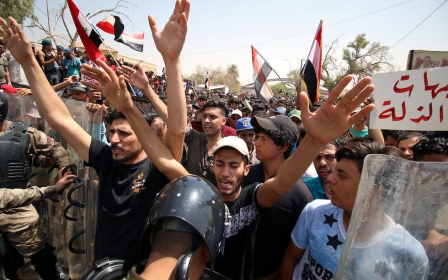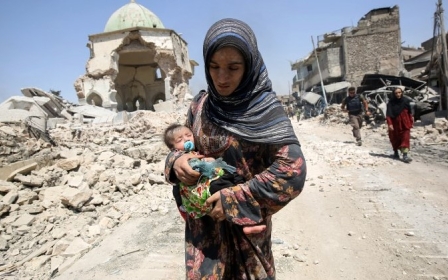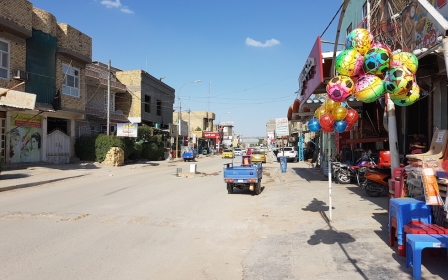Iraqi police use batons against protesters outside Basra oilfield
Iraqi police wielded batons and rubber hoses to disperse about 250 protesters gathered at the main entrance to the Zubair oilfield near Basra on Tuesday as unrest across southern cities over poor basic services gathered pace.
Since demonstrations began nine days ago, protesters have attacked government buildings, branches of political parties and powerful Shia armed groups, and stormed the international airport in the holy city of Najaf.
On Tuesday, members of the Iran-backed Asaib Ahl al-Haq militia warned that they would deal harshly with protesters who attempted to target their offices.
"If your hands reach our offices, we will cut them off," they said in a news conference.
“These evil crows are part of a Zionist-American, Gulf-Turkish plot.”
At least five people have been killed since protests began last week, while scores have been wounded. Some analysts have suggested that the death toll is much higher.
Iraqi authorities on Tuesday afternoon had reportedly issued 50 arrest warrants for reporters covering the protests.
Officials and industry sources said the protests have not affected output at Zubair, run by Italy's Eni, and the other major oilfields including Rumaila developed by BP and West Qurna 2 managed by Lukoil.
Many Iraqis believe their leaders do not share the country's oil wealth. Some demonstrators said foreign labourers were robbing them of employment at oil companies.
"We the people of Basra hear about the Iraqi oil and its huge revenues, but we never enjoy its benefits," said 24-year-old protester Esam Jabbar.
"Foreigners have decent jobs at our oilfields and we don’t have the money to pay for a cigarette. That’s wrong and must be stopped." Jabbar said he was unemployed.
Blood ran down one policeman's face after protesters hurled stones. Policemen also threw sand to put out tyres that the protesters had set ablaze.
Orders against 'live fire'
Iraq is the second-largest producer in the Opec energy cartel after Saudi Arabia.
Crude exports account for 95 percent of state revenues and any disruptions could badly damage an already limping economy at a time when Iraq needs tens of billions of dollars to rebuild after the three-year war with the Islamic State group (IS).
Prolonged instability in the south could drive up global oil prices. Production at the Zubair field was 475,000 bpd, an Iraqi oil official said in May.
Iraq exported an average of 3.566 million barrels per day from its southern oilfields so far in July, said senior oil officials, levels confirming that the troubles have not disrupted crude shipments from the region.
Demonstrators, who have endured sweltering heat to press their demands, show no sign of letting up. They have vented anger in Basra, the biggest city in the south, Samawa, Amara, Nassiriya, Najaf, Kerbala and Hilla.
"We had orders not to use live fire but we also have orders not to allow anyone to disrupt operations at oilfields and we will take necessary measures to keep the protesters away from the fields," said a policeman at the scene.
Protests over the same issues have occurred in the past. The unrest this time is more widespread and is politically sensitive.
Prime Minister Haider al-Abadi is seeking a second term after a 12 May parliamentary election tainted by allegations of corruption.
Politicians are struggling to form a coalition government with Shia cleric Moqtada al-Sadr, whose political bloc - which included the Iraqi Communist Party won most votes in the poll, now in a strong position to influence the choice of prime minister.
He defeated Iranian-backed rivals by promising to generate jobs, help the poor and eradicate corruption.
The Shia heartland south has long been neglected despite its oil wealth, first by Sunni dictator Saddam Hussein and then Shia-led governments after him, including Abadi's.
In a statement sent to Middle East Eye, the Iraqi Communist Party called for the right for peaceful protest to be respected.
"We condemn and condemn the use of violence against the protesting citizens, condemn any attack on public and private institutions, the headquarters of the parties and houses of residence, and emphasise the respect of the members of the armed forces," they said.
"These demonstrations are in line with the spirit of the constitution and the citizen's right to express his opinion and demands, which must be sponsored by the state, federal government and local governments, and safeguard the lives of the demonstrators and ensure their safety."
"It is therefore unacceptable to resort to the use of live bullets and excessive use of force, the processing of lists of arrests involving known civilian activists and other methods rejected in a constitutional country that wants to consolidate democratic life."
Fetid piles of garbage can be seen on many Basra streets. Stagnant water with sewage has caused health problems and tap water is sometimes contaminated with mud and dust. Electricity is cut off for seven hours a day.
Murtadha Rahman, 22, ran barefoot on the scorching pavement to try and escape a charge by police outside the Zubair field.
"I live in a place which is rich with oil that brings billions of dollars while I work in collecting garbage to desperately feed my two kids. I want a simple job, that’s my only demand," said Rahman, who said he was beaten by police. "I won’t go - even if you kill me I will stay here. I want a job."
In a meeting with government officials carried on state television, Abadi promised to allocate funds for water and electricity and create jobs in Basra, once dubbed the “Venice of the Middle East” for its network of canals.
Middle East Eye propose une couverture et une analyse indépendantes et incomparables du Moyen-Orient, de l’Afrique du Nord et d’autres régions du monde. Pour en savoir plus sur la reprise de ce contenu et les frais qui s’appliquent, veuillez remplir ce formulaire [en anglais]. Pour en savoir plus sur MEE, cliquez ici [en anglais].





